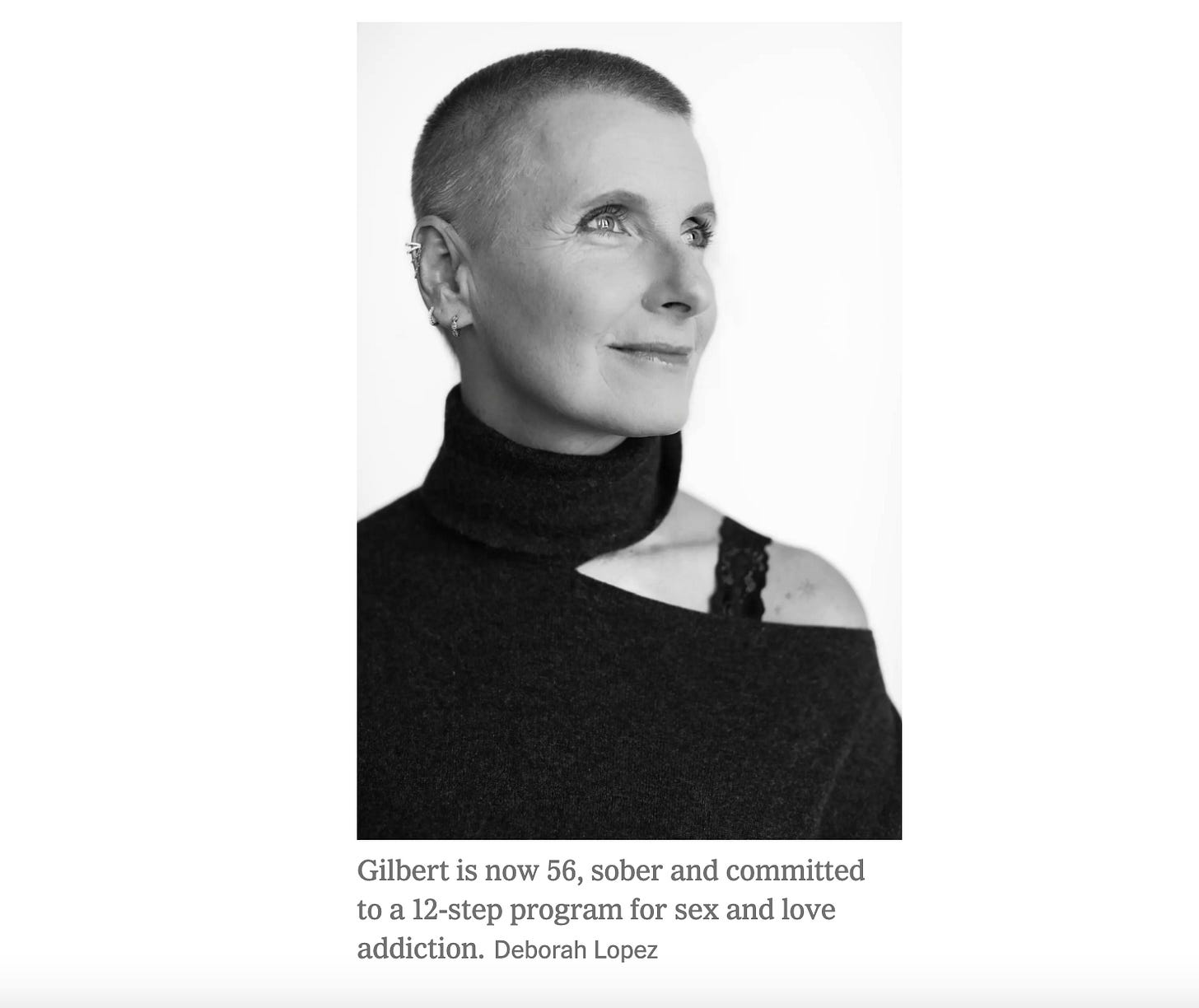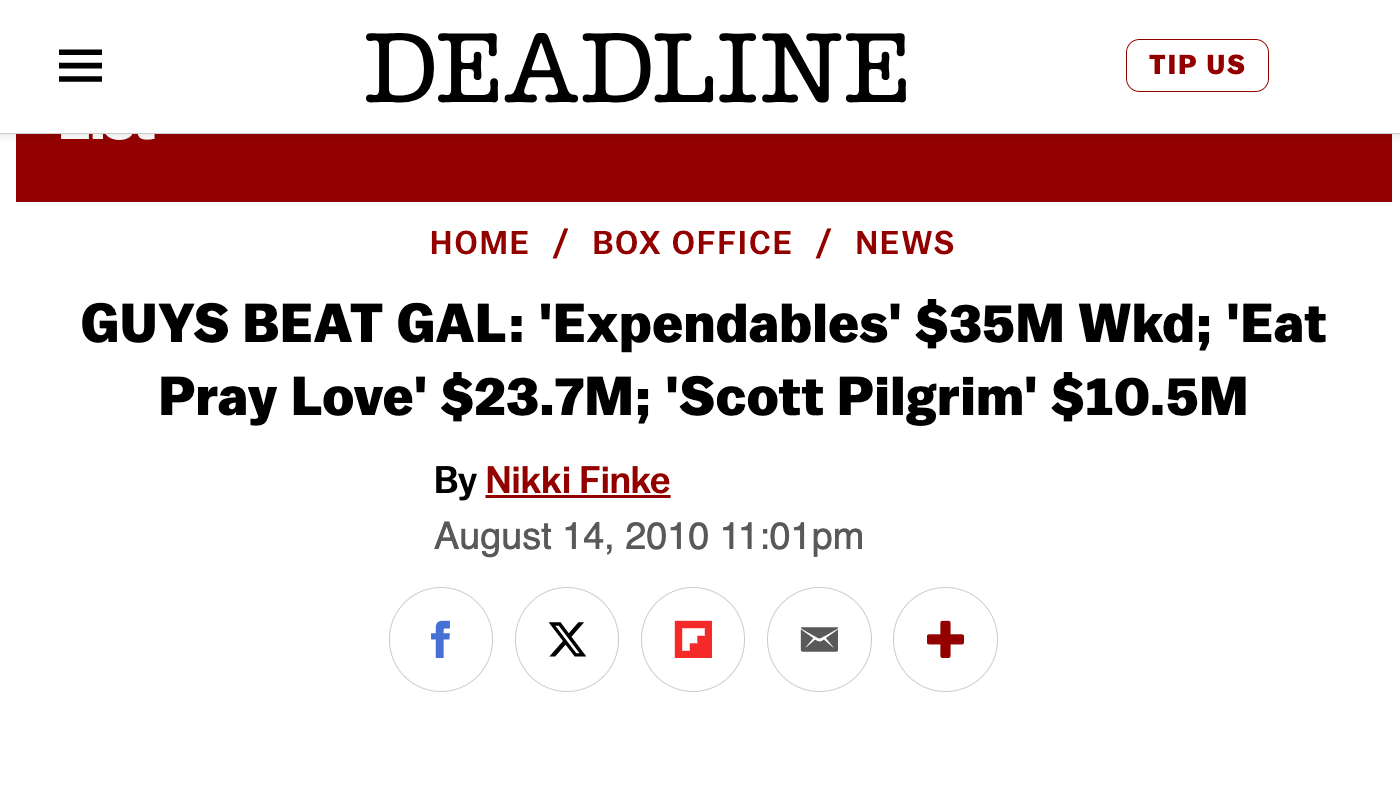Eat, Prey, Poison
The "Eat, Pray, Love" lady is back with a new memoir in which she goes lesbian and then tries to murder her lady love.
Elizabeth Gilbert never struck me as a wise person to take advice from, but many women didn’t follow my advice: she sold nine million copies of Eat, Pray, Love, her self-help memoir about divorcing your husband to find yourself (in romantic destinations).
In her new memoir, All the Way to the River, Gilbert turns lesbian and then plots to murder her lady love. From the New York Times:
By Alexandra Alter
Sept. 5, 2025
In July 2017, the author Elizabeth Gilbert posted a message to her million-plus Facebook followers about her partner, Rayya Elias, who was dying of pancreatic and liver cancer. … By then, Gilbert’s audience knew about Elias, her longtime friend and hairdresser turned lover. She had announced their relationship the previous fall, revealing that she had ended her marriage to be with Elias, who doctors predicted had six months to live. …
Elias, a former heroin addict who had been sober for years, slid back into addiction after her diagnosis. She stayed up all night in their East Village penthouse, ingesting whiskey, morphine, Vicodin, marijuana, fentanyl and thousands of dollars worth of cocaine, which Gilbert bought from teenagers in the neighborhood. …
Around the time she posted the video of Elias singing, things had gotten so bad that Gilbert decided the only way to save herself was murder. Exhausted and terrified, she planned to replace Elias’s morphine with sleeping pills, then cover her with enough fentanyl patches to kill her. She had swapped the pills and was prepared to act but abandoned the plan when Elias sensed something was up and confronted her.
That reminds me of the review I wrote 15 years ago about the movie version of Eat, Pray, Love with Julia Roberts, which did pretty well at the box office ($200 million globally) despite being neither a romantic comedy (it wasn’t funny) nor a romantic drama (it wasn’t dramatic either).
Steve Sailer
Taki’s Magazine, August 17, 2010
Four decades into the feminist era, the number one movie at the box office is Sylvester Stallone’s The Expendables, in which Eighties action heroes blow stuff up. Right behind is Julia Roberts’ Eat, Pray, Love, in which a divorcée expensively feels sorry for herself in Italy, India, and Indonesia. (Iowa, Indiana, and Idaho presumably being all booked up.)
Then I put on my Old Market Researcher’s hat and reflected on the zeitgeist of 2010, one of the least woke years of recent times:
I don’t think it’s too scandalous in 2010 to point out that these films are aimed at disparate audiences.
Today, in fact, it’s hard to remember how nervous such observations made the bien-pensant as recently as the early 1990s, in the wake of the Anita Hill-Clarence Thomas brouhaha. Back then, it was almost mandatory to add after any subversive notice of sex differences, “But, of course, that’s all due to dressing baby boys in blue and baby girls in pink; if it weren’t for society, everybody would like the same things.”
When depressed about the intellectual flaccidity of the 21st Century, I cheer myself up by noting that nobody wholly subscribes to feminist orthodoxy anymore.
And yet a few years later during the Great Awokening, lots of people went back to being 100% dogmatic feminists.
Most people can now admit that social conditioning isn’t what differentiates the sexes; instead, it’s the only hope of their ever getting along civilly. When allowed to indulge their inner fantasies, however, as incarnated in movies such as The Expendables and Eat, Pray, Love, the sexes barely seem to inhabit the same planet.
Eat, Pray, Love is faithfully adapted from magazine writer Elizabeth Gilbert’s 2006 memoir/self-help book, which sold nine million copies. Tiring of traditional novels, Hollywood has been pouring money into developing undramatic nonfiction books. For example, Brad Pitt is playing Oakland A’s general manager Billy Beane in Michael Lewis’s baseball statistics book Moneyball.
Which, much to my surprise, turned out really well.
And there’s the legendary possibility that Leonardo DiCaprio will portray writer Malcolm Gladwell in the social science pastiche Blink.
Which, not to my surprise, never got made.
Eat, Pray, Love embodies Oprahlosophy so cunningly that I might suspect it of being another hoax, like Oprah’s earlier autobiographical fave, A Million Little Pieces. Yet, trying to discern which events Gilbert might have concocted is pointless, because there are practically no events in the movie. Julia Roberts merely alternates between looking radiant and looking gaunt.
When her handsome but underachieving husband (played by Billy Crudup, the rock star in Almost Famous) admits he doesn’t want to go to Aruba with her on her latest travel writing junket, she announces that she wants a divorce, breaking his heart. After some counseling from her best friend (Viola Davis of Doubt, who almost succeeds in lending dignity to the role of Liz’s own personal Oprah), she rebounds into the arms of a handsome actor (James Franco of Pineapple Express), who is playing her husband in the (quite bad) Off-Broadway play Liz wrote about herself.
Liz then decides, however, to dump her ardent new boyfriend and spend a year in the three aforementioned I-Countries (because, to Liz, it’s all about me). She moves to Rome, where she eats enough pasta to blimp up from a size -2 to a -1. She then decamps to an ashram in India to meditate for four months. There, she has deep conversations with a folksy Texan (Richard Jenkins, Oscar-nominated for last year’s The Visitor).
Finally, she’s off to beautiful Bali, where she meets a sentimental Brazilian (Javier Bardem, now with a better haircut than in No Country for Old Men).
That’s more plot description than I normally shove into a review. So then I switched to my preferred mode: here’s some interesting information that no other film critic would think to include, but is actually helpful to you getting more out of the movie (or just my review if you don’t see the film).
I’ve always wondered why Bali is so much more popular with tourists than the rest of Indonesia. It turns out that Bali’s graceful culture stems from when the Hindu elites of neighboring Java fled Muslim conquest, making Bali the only Hindu island in a mostly Muslim archipelago.
I found that out from Wikipedia, however, not from the movie, which didn’t, God forbid, have time to impart any such information because it needed all 133 minutes for Liz’s journey of self-discovery.
At this point, a couple of hours in, some dramatic tension finally arises: Since Crudup, Franco, and Jenkins weren’t good enough for her, will Bardem finally suffice? Or will Liz hold out for a sequel in which she’s courted by Pitt and DiCaprio? Perhaps by the second sequel, digital reanimation of actors will have progressed enough that she can be wooed and won by a revivified Cary Grant?
The glossy lifestyles portrayed in chick flicks always raise the question, “How can she afford that?” Yet, money goes unmentioned as unromantic. That reminds me of the 1970s when I was repeatedly told that free agency would make pro sports unpopular by exposing tawdry fiscal matters. Money talk, though, just made pro sports even more popular.
In my experience, women are extremely interested in how much things cost. I suspect that, just as men like talking about LeBron James’s contract, women would enjoy a romance movie that dishes on how much the heroine is shelling out.
Maybe the sexes aren’t so different after all?
Are people who make a fortune giving advice mostly crazy?




Thank you for reminding me how annoyed I was at finding ten years after "Eat" was published that her "journey" was funded by her publisher. It wasn't some "magical" reflective moment guided by a personal quest. All involved did a great job keeping that tidbit under wraps.
Wasn't it part of a publishing wave of authors "living in the moment" and writing about it? They would decide to live a certain way for a year... and jot it all down. I did find entertaining a book from that time, "A Year Without Made in China". The author and her family decided to forego buying anything from China... and learned how brutally hard it was. I think her kids only got Legos as birthday and Christmas presents that year.
Anyway, thanks for the reminder of how annoying Gilbert was. And still is, it seems.
Sadly, we live in the age of unleashed toxic-femininity of which Liz Gilbert is fine example.
As I recall the actual real-life story here is much more enlightening and entertaining. The sad sack Brazilian she ended up with after her year of eating and praying was quite a bit older and less attractive then her boring old husband. And while she wanted romantic adventure, he really, really wanted them to settle in the US so he could get a green card. Of course, she dumps him after a few years to go lesbian--presumably the Brazilian got to stay in the US.
And the real winner in all this was ... her ex-husband, who--again this is just what I read somewhere (probably when Steve did his piece)--who post-divorce met and married a younger woman and has some children with her. (Something "it's all about me!" Liz Gilbert could never quite get around to.)
Congrats to Gilbert's ex-husband! Whether through luck or good fortune you managed to get out from under the Gilbert train wreck and have an actual life. Well done!